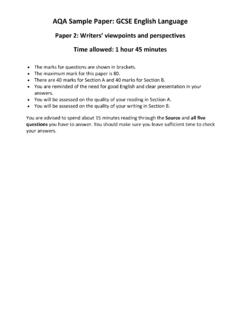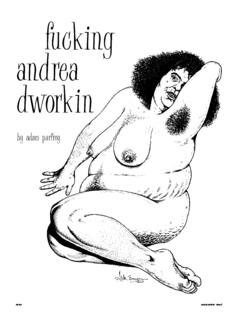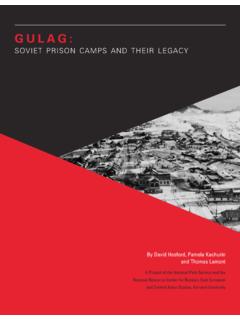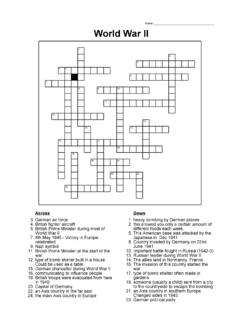Transcription of WJEC GCSE History Paper 1 - CHCC Index
1 1 wjec gcse History Paper 1 Germany 1918-45 Revision Booklet 2 Germany 1919-1933: Weimar Republic* *Weimar is the town the politicians met in and a Republic is a country without a King or Queen The end of WWI November 1918 Germany was in a very poor state: the blockade of Germany had lead to a lack of food and supplies. People were starving. Riots were breaking out. The navy had mutinied (rebelled) against the Kaiser (king of Germany). The Kaiser realised the situation was hopeless and abdicated (quit his job) in October 1918. Germany was left without a leader and in a mess. The biggest political party in Germany was the Social Democrats.
2 Their leader, Friedrich Ebert, took on the job of running Germany. He tried to improve people s lives by giving them better working conditions and freedom of speech. Ebert and his government signed the armistice and withdrew from Germany from WW1 in November 1918. The Weimar Constitution The Social Democrats won the January 1919 elections. They held the first meeting of their new government in a town called Weimar and got the nickname The Weimar Government . Their first job was to write a new constitution (set of rules) for Germany. Their new rules included: 1. everyone over the age of 20 could vote, people voted for MPs who would sit in the Reichstag, the Reichstag would suggest and vote on new laws, 2.
3 The Chancellor would be head of the Reichstag and would be voted for every 4 years, 3. There would be a President who would choose the Chancellor and keep control of the army and he would be voted for every 7 years. 4. Germany would use a system called Proportional Representation; this means each political party would get a fair share of the seats in the Reichstag if a party won 10% of the votes they would get 10% of the seats. 5. Proportional Representation seemed fair but had lots of problems; there was so many parties in the Reichstag that no party ever had a majority (over 50% of the seats) so they couldn t pass laws by themselves. This meant parties had to make deals with each other and this slowed the whole process down.
4 It also helps Hitler get into power later. Strengths of the Weimar Constitution Weaknesses of the Weimar Constitution Very fair, particularly the voting Allowed lots of people to have their say State governments would ensure local issues were addressed Proportional Representation meant that there were loads of different parties in the Reichstag it was difficult to get them to agree on anything 3 Wouldn t allow one person to take over the Chancellor and President balanced each other A poor Chancellor or President would only be around for a limited time Article 48 could be abused so that the President stopped listening to the Reichstag State governments could pass laws that went against what the Reichstag wanted Not everybody was happy with
5 Germany being a democratic country and they didn t like the way Weimar Germany was being run by Ebert. The Spartacist Revolution January 1919 In January 1919, the German communist party (the Spartacists) decided that they wanted to take over Germany from Ebert. They started a revolution attempt on 6th January. It was not successful. In a week, Ebert with the help of his Freikorps (ex-WWI soldiers paid to help the government keep order) had stopped the rebellion and killed many communists. The Spartacist leaders, Rosa Luxemburg and Karl Liebnecht, were murdered. It was helpful for Ebert that the Spartacists were no longer a threat.
6 However, he had to rely on the Freikorps to keep order that made him look weak to the public, and it was risky as the Freikorps could turn on him at any point. The German communists continued to create riots around Germany, even after the Spartacist Revolution failed. Freikorps had to be sent round to fight them and stop them. Other opposition to the Weimar Government The right wing also hated the Social Democrats. The Freikorps themselves went against Ebert in 1920 when they supported Wolfgang Kapp in his attempt to take over the country (Kapp Putsch). It was only because of the workers in Berlin going on strike and refusing to help the Freikorps, that the Putsch failed.
7 4 Over 200 people connected to the Weimar Government were assassinated between 1919 and 1923. The most famous was Walther Rathenau, the politician who had been involved with the armistice and the Treaty of Versailles. These assassinations showed how much people disliked their new government and also made people feel that they were doing a bad job as they weren t stopping violence on the streets. The Treaty of Versailles June 1919 This is the peace Treaty Germany had to sign after World War One. The government had no choice but to sign the treaty; if they didn t sign the war would continue and Germany would lose. The Main terms can be summed up as BRAT Blame Germany had to accept responsibility for starting the war and causing all the damage.
8 This is called the War Guilt clause. Reparations Germany had to pay billion to pay to repair the damage caused by the war. Armed Forces the Germany army was reduced to 100,000 men, and they couldn t have any tanks, submarines or planes. The Rhineland (an area of Germany that borders France) was also demilitarised so no German troops could go there. Territory Germany lost 13% of their land and of their population. They also lost all their colonies so they no longer had an empire. Germany was also forbidden to join with Austria. Some of the land they lost was industrial land with coal mines etc on; this meant they lost a way to produce income for Germany.
9 The Germans were outraged. They called the Treaty a diktat (dictated peace) and accused the Weimar Government of stabbing them in the back by agreeing to such harsh terms. People began to look to other politicians to rule Germany better than the Social Democrats. The beginnings of the Nazi Party Anton Drexler had a party called the German Workers Party. Hitler joined this in 1920 as he agreed with what the party was saying about getting rid of the Treaty of Versailles. Hitler soon became its leader. He re-named it the National Socialist German Workers Party (NSDAP/Nazi Party). He gave the party a new flag and a new private army to protect it (the SA/Brownshirts).
10 5 The party was small and would meet in beer houses. It began to attract attention because of Hitler s powerful speeches, especially his rants against the Treaty of Versailles. The SA would also beat up opponents, especially the communists. 1923 The Invasion of the Ruhr, Hyperinflation and the Munich Putsch Germany paid her first reparation payment in 1921 but couldn t afford the 1922 payment. France and Belgium decided to invade Germany in January 1923 and take the payment by force. They invaded the Ruhr, Germany s main industrial area, to take goods, such as coal. The Germans reacted with passive resistance. They went on strike and refused to make the goods that the French and Belgians wanted.








